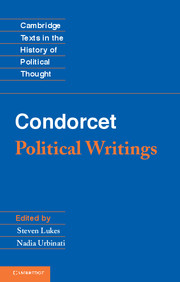Book contents
- Frontmatter
- Contents
- Condorcet: published works
- Principal events in Condorcet’s life
- Notes on the texts
- Editors’ introduction
- Suggestions for further reading
- 1 The Sketch
- 2 On slavery
- 3 On the emancipation of women
- 4 On despotism
- 5 On freedom
- 6 On revolution
- 7 Advice to his daughter (written in hiding March 1794)
- Index
5 - On freedom
On the meaning of the words ‘freedom’, ‘free’, ‘a free man’, ‘a free people’ (1793–94)
Published online by Cambridge University Press: 05 June 2012
- Frontmatter
- Contents
- Condorcet: published works
- Principal events in Condorcet’s life
- Notes on the texts
- Editors’ introduction
- Suggestions for further reading
- 1 The Sketch
- 2 On slavery
- 3 On the emancipation of women
- 4 On despotism
- 5 On freedom
- 6 On revolution
- 7 Advice to his daughter (written in hiding March 1794)
- Index
Summary
Freedom for an individual is to have the will to act in accordance with what his intelligence leads him to recognise as being most useful to him. On seeing, or remembering, an object man feels a desire, that is to say, a sentiment associated with the memory of a pleasure given to him by that object, and he wants to savour that pleasure again and act in ways that can recapture that pleasure for him. These acts of will, when you analyse them, are nothing more than the feelings associated with remembering that those actions have [always] recaptured the remembered pleasure, and that any other feelings we remember, if we remember them clearly enough, had a similarly successful outcome. So far I see a being whom we can call active, but for whom freedom does not yet exist. But if, on seeing that same object, if by remembering less intensely the feelings from which an action is willed, he can stop wanting to take the action needed to attain the desired objective, if therefore he can stop wishing to attain that objective, then he is free. But he only has this ability because he is somehow motivated not to exert his will; either because of another desire or a sentiment of fear. Every being is free who is able to have two contradictory sentiments relating to the same action, and who can decide either to wish, or not wish, to take that action in complete awareness that his will is conforming to one of the two sentiments. He is free when experiencing the two sentiments and is conscious of doing so. The more the two sentiments are in play when he acts, and the more sharply aware of them he is, the more his freedom is complete. Freedom ceases when there is just one desire to which the will succumbs automatically. Freedom is more keenly felt than that, and has more intensity than a single desire. However, the will can be suspended precisely through fear of succumbing to that single impulse, of not being able to reflect on contradictory impulses.
- Type
- Chapter
- Information
- Condorcet: Political Writings , pp. 181 - 189Publisher: Cambridge University PressPrint publication year: 2012



